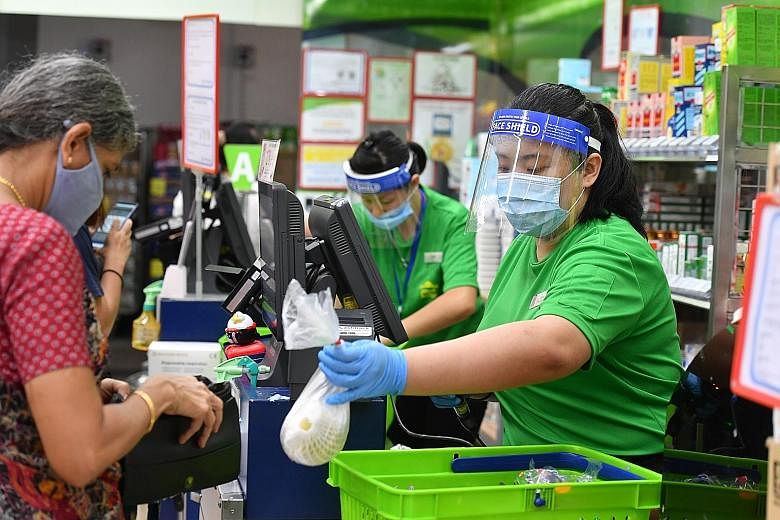After the annus horribilis that was 2020, which ushered in the worst economic recession in Singapore's history, the economy will rebound in 2021.
But we cannot yet be confident that this will segue into sustained growth, because the shadow of Covid-19 still looms large.
There are three dimensions of this that will weigh on the economy.
The first is global economic conditions. Despite Singapore's commendable control of the pandemic, it has a high dependence not only on trade, but also on the cross-border flows of people.
So while Singapore's success in pandemic control is a necessary condition for the economy to mount a sustained recovery, it is not sufficient. The success of other countries - especially those with which Singapore has strong linkages - is also important.
Second, the recession induced by the pandemic was not a normal recession. Not all sectors of the economy were equally hit.
Some were (and remain) devastated, others were relatively less affected and a few prospered even more than before the pandemic. The unbalanced nature of the recession will have important implications for the pace and trajectory of the recovery.
Third, the year-long pandemic will have enduring after-effects. Some of these will be positive, such as the acceleration of digitalisation among consumers and businesses, which will not be reversed.
But others are negative, including the invalidation of longstanding business models, disrupted supply chains and rising corporate distress, which will come into sharper focus only later this year and could have ripple effects.
Global uncertainties
The low base for gross domestic product (GDP) last year, rising consumer confidence as vaccines are deployed and the release of pent-up demand will ensure that all economies rebound by varying degrees this year.
For Singapore, the official projection is for 4 to 6 per cent growth. Although this will be the highest in a decade (helped by a low base following a contraction of 6.5 to 6 per cent last year), GDP will still remain below pre-pandemic levels till at least the end of this year.
The economies of Singapore's major trade partners will also rebound - China by 8.2 per cent, the United States by 3.9 per cent, the euro zone by 5.2 per cent, and the Asean-5 (Indonesia, Malaysia, Philippines, Thailand and Vietnam) by 6.2 per cent, according to the International Monetary Fund (IMF) in its latest (October) World Economic Outlook.
-
$14.3b
Estimated value of foreign investment commitments in the first half of last year, compared with $15.2 billion for the whole of 2019.
83%
Visitor arrivals to Singapore were down year on year from January through end-October. Cross-border travel to and from Singapore is still subdued.
But a couple of caveats here: First, despite rebounding, the GDP of the US and euro zone - two of Singapore's three largest trade partners - will still fall short of 2019 levels. And second, after October, large parts of the US and the euro zone (as well as some Asian countries) faced renewed waves of coronavirus infections and intensified their lockdowns, stifling economic activity - which could make the IMF's provisional projections look optimistic.
Cross-border travel to and from Singapore is still subdued. From January through end-October, visitor arrivals were down 83 per cent year on year.
While the Government plans to introduce "travel bubbles", the effectiveness of these will depend not only on how well Singapore controls the pandemic, but also on how well other countries do so, which is still uncertain; Singapore can open its borders, but this will not do much good if other countries cannot open theirs, or impose draconian travel restrictions.
As long as this uncertainty persists, the prospects for tourism-dependent sectors such as aviation and large parts of hospitality, food and beverage, offline retail and entertainment will remain precarious.
Unbalanced recession, incomplete recovery
As in many countries, Singapore's recession has been highly uneven. A few sectors or sub-sectors such as e-commerce, domestic logistics, supermarkets and technology-intensive and biomedical sectors have flourished, thanks to changes in consumer behaviour, rising digitalisation, and strong demand for semiconductors and medical supplies.
Financial services as well as parts of manufacturing have held up reasonably well. But high-contact sectors, such as tourism-related industries, have been badly hit.
The brunt of the Covid-19 recession has mainly been borne by the labour-intensive service sector, which is true of virtually all economies. Thus, in its biannual Macroeconomic Review in October, the Monetary Authority of Singapore cautioned that "some pockets of the economy may not recover to pre-pandemic levels even by the end of (2021)" and that the economic rebound the economy experienced in the third quarter "is expected to fade to an incomplete recovery".
It also flagged the likelihood of firms and households holding back on investment and discretionary spending because of income losses and increased uncertainty.
There is another aspect of unbalanced recessions - where corporate distress is particularly concentrated in specific sectors - which is worrisome, and that relates to jobs.
Recent research by economists from the Bank for International Settlements indicates that such recessions "tend to be deeper and longer, and leave an especially large imprint on the labour market, likely because of skill mismatches and sector-specific human capital". In other words, in unbalanced recessions, job losses tend to be concentrated in certain areas of the economy, whereas job vacancies tend to arise in totally different areas that need specific skills.
This has been the case in Singapore, where many of the job losses so far have been in aviation, offline retail, hospitality and the food and beverage industry, and among non-PMETs (professionals, managers, executives and technicians), whereas many of the vacancies are in technology sectors, healthcare, finance and parts of manufacturing, and PMETs are in high demand.
While retraining, career-conversion programmes and job fairs launched by the Government have helped fill some of the vacancies, job matching has still been a struggle.
In October, the Manpower Ministry revealed that although about 117,500 new positions were created by the National Jobs Council by the end of August, only 33,100 local job seekers were placed in these roles. This suggests that even if GDP rebounds, the unbalanced nature of the recession means that employment may take longer to recover than it usually does after more balanced recessions which hit all sectors more or less equally.
Hidden distress
So far this year, many companies have been shielded from the worst impact of the pandemic-induced recession by the Government's aggressive fiscal measures as well as reprieves on loan repayments and other contractual obligations. If not for the wage subsidies under the Jobs Support Scheme - which were initially broad-based across sectors - as well as loan guarantees and other fiscal assistance, the growth and unemployment numbers would have been far worse.
The deferment of loan repayments for small and medium-sized enterprises, the higher thresholds for bankruptcy and insolvency as well as moratoriums on legal action over rents and contracts, have also handed a lifeline to thousands of companies.
But a lot of this will change this year. Fiscal support is likely to be less broad-based and more targeted - as it should be, to avoid propping up unviable firms. The forbearance on loan repayments by banks will end, as will the moratoriums on legal actions.
At that point, a lot of corporate distress which was hidden last year will come into view. Bankruptcies, which have so far been subdued, will shoot up. This will have ripple effects - a bankrupted restaurant, for instance, will also impact its landlord, its food and equipment suppliers, and other service providers.
Mr Alfonso Garcia Mora, vice-president for the Asia-Pacific at the International Finance Corporation - the World Bank's private sector lending arm - forecasts that bankruptcies in the region could rise by 30 per cent this year.
Singapore's corporate sector is unlikely to be spared. This in turn will lead to increases in banks' non-performing loans - which are typically a lagging indicator in any economic crisis.
Not all doom and gloom
The year 2021 will not be all doom and gloom for the economy. Many businesses have gone digital and transformed their business models to become more cost-efficient and productive - which will be a permanent change that will augur well for their future.
Singapore has strengths in many of the core industries that may benefit from tailwinds in the post-pandemic era, such as semiconductors, biomedical and digitally powered business and financial services. It has been able to attract significant foreign investment commitments, even during the pandemic - about $14.3 billion in the first half of last year, compared with $15.2 billion for the whole of 2019.
And as vaccines proliferate globally, consumer confidence around the world will surge and even travel-related sectors will open up. But Covid-19 will still continue to cast a shadow on the economy - even as it recovers - well into 2021.












